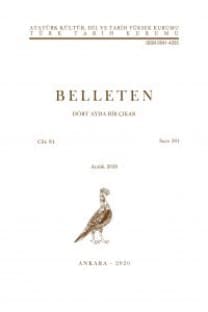Sultan II. Abdülhamid Devri Camilerine Eskişehir Mahmudiye’den İki Örnek: Çarşı ve Hara Camileri
Sultan II. Abdülhamid Devri, Osmanlı İmparatorluğu’nun Anadolu’da en çok eser inşa ettiği dönemlerden biridir. Özellikle güçlü merkezi devleti temsil eden hükümet konakları, okullar, hastaneler, redif daireleri ve saat kuleleri, Anadolu kent ve kasabalarının çehrelerini değiştiren yapılar olarak ön plana çıkmaktadır(1). Merkezi devlet tarafından bilinçli olarak yürütülen, kentlerin yapısını değiştirmeye yönelik bu mimari tutum, Osmanlı’nın tebaasıyla kurduğu iletişimin en önemli aracı niteliğindedir. Verilmek istenen mesaj, Batılılaşan “güçlü” imparatorluğun yeni ideolojisinin yönetim biçimi olan “modern monarşinin”, halka kabul ettirilmesidir(2). Bu anlamda, imparatorluğun sembolleri ile zenginleştirilmiş, Batılı Klasik mimarlığın egemen olduğu eklektik bir anlayışla oluşturulan “İmparatorluk üslubunun”, söz konusu iletişimin, mimari dili olarak hizmet etmesi dikkat çekicidir.
Two Examples for the Mosques of the Era of Sultan Abdulhamid II from Mahmudiye District of Eskişehir: Çarşı and Hara Mosques
The Era of Sultan Abdulhamid II is an era in which the power of the government was expressed indirectly to the public via various symbols. Besides the instruments like ceremonies, decorations, albums and clothes, the architecture has become one of the most important symbols of the Era of Power of Abdulhamid II. Many multi-functional buildings have been built in Anatolia with a classical style representing the "strong empires" conquered from the west. In addition to these buildings in which the centralism was expressed and which were established for the needs of "modern monarchy", traditional buildings such as mosque, madrasah, fountain were continued to be built with the same understanding. Especially for the mosque architecture, the traditional architectural principles and ornament features of the Ottoman have been collated with the styles of the West and considerably different, hybrid architecture has been gained. Çarşı and Hara Mosques of Mahmudiye District of Eskişehir turn out to be the important buildings representing the general features of the era. In the scope of this research, the features as plan-location, mass-fecet, structure, technical material, decoration features of both mosques will be determined and the place and importance of them will be evaluated within the architectural characteristic of the era.
Keywords:
Ottoman Empire, Sultan Abdulhamid II, Mosque Eskişehir,
___
- ISSN: 0041-4255
- Yayın Aralığı: Yılda 3 Sayı
- Başlangıç: 1937
- Yayıncı: Türk Tarih Kurumu
Sayıdaki Diğer Makaleler
Gazi Hüsrev Bey'in Saraybosna'daki vakıfları
Bozkurt Kurgan Mezarlığı Kazıları
Fransız Gezgin Vital Cuinet’in Gözüyle Çankırı
Buda'da Bizans İmparatorları ve Elçileri
Yok olan kültür varlıklarımızdan Denizli'deki Kurşunluoğlu Konağı
Hakan YILMAZ, Rafet ÇAVUŞOĞLU, İsmail BAYKARA, Timur GÜLTEKİN, Bilcan GÖKCE
Edirne Bulgar Cemaati ve Polonya Azınlık Okulu “Polak Mektep”
Yok Olan Kültür Varlıklarımızdan Denizli’deki Kurşunluoğlu Konağı
